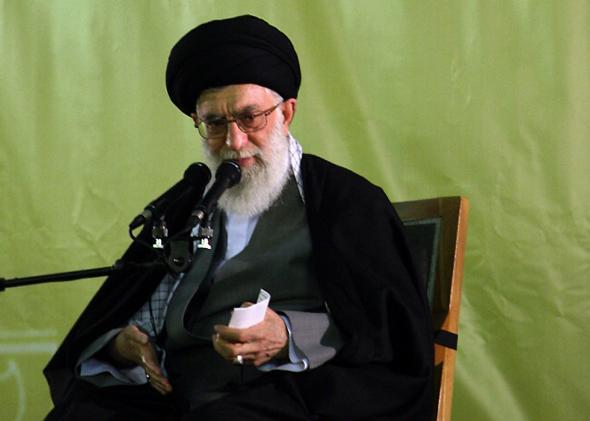In Geneva this week, an Iranian delegation has been holding talks with six other nations about its country’s nuclear program. These negotiations—the first to take place under the auspices of Iran’s new president, Hassan Rouhani—inspired little bursts of positive rhetoric. The BBC reported an “upbeat mood” in Geneva. A European diplomat spoke of “cautious optimism.” Rouhani himself had pledged to “resolve” the nuclear problem within the next six months.
After years of no progress with Iran, why the sudden good cheer? It’s certainly not because Rouhani represents a radical new strand of Iranian thinking about nuclear power. After all, he was Iran’s nuclear negotiator from 2003 to 2005. Parts of the nuclear program were temporarily suspended during that time, but it was never eliminated.
Nor does Rouhani’s new Cabinet mark a profound break from those who have run the Islamic Republic since its inception. As his justice minister, Rouhani has appointed Mostafa Pourmohammadi, a former high official in the Ministry of Information in the bloody and violent 1980s. Among other things, Pourmohammadi was one of those primarily responsible for the mass execution of thousands of political prisoners in 1988. He moved on to the ministry’s foreign intelligence operations in the 1990s, when its “achievements” included the bombing of a Jewish community center in Buenos Aires and the assassination of dissidents in Iran and around the world.
No one is denying this bit of history. After appointing Pourmohammadi, Rouhani went out of his way to praise his “numerous experiences in the government” and his record: “He has been successful, wherever he has been.” Little appears to have changed: In the week of Sept. 23, when Rouhani was at the U.N. General Assembly in New York, more than 30 Iranians were reportedly executed without due process of law.
Rouhani’s team, in other words, has not gone to Geneva after a process of profound internal transformation. On the contrary, Iran has returned to negotiations for only one reason: The new president wants economic sanctions lifted because they have taken a powerful toll on the Iranian economy. At a recent conference in London, I heard Iranian diaspora economists return again and again to that theme: Sanctions have destabilized Iran’s currency, oil and gas industry, international trade, and investor confidence. Of course the shortcomings of sanctions are well-known: They are a blunt and inefficient instrument; plenty of people defy them; and illicit trade goes on all the time. And, yes, they distribute economic pain over the entire population and don’t necessarily hit hardest the people who make the decisions. Nevertheless, three decades’ worth of overlapping unilateral and multilateral sanctions on Iran, organized at different times by the United States, the United Nations, and the European Union, are, at least in a narrow sense, “working”: They have forced Iran’s leaders back to a negotiating table they had largely abandoned some years ago.
The sanctions’ success has also persuaded the Iranians to try a tactic that has worked well for many other countries, including Russia: Persuade the West to keep its foreign policy concerns in silos—separating economics, human rights, and nuclear weapons, as though they have nothing to do with one another. Iran’s oil ministry has even launched a kind of outreach campaign, declaring that “Iran welcomes any oil cooperation, even with American companies.” Presumably the Iranians believe that those U.S. oil companies would lobby the Obama administration, hard, to lift sanctions altogether.
Such lobbying would be extremely short-sighted. If Iran is able to make concrete, verifiable nuclear proposals, some changes could of course be made to the sanctions regime. Some have suggested unfreezing Iranian assets held abroad as an option. But while negotiations continue, let’s be clear about why the world cares about Iran’s nuclear program in the first place.
Certainly we in the United States aren’t overly worried about Britain’s nuclear arsenal or about India’s. The United States is hardly in a position to oppose nuclear weapons in principle, since we and several of our allies have them. No, we oppose Iran’s nuclear ambitions for one reason: because we object to the Islamic Republic of Iran, a quasi-totalitarian state that since 1979 has been led by brutal, volatile men with no respect for the rule of law. Their regime is a “domestic” problem for many Iranians, and it’s a major problem for Iran’s neighbors and the rest of the world.
To put it differently: As long as men like Pourmohammadi are still running Iran’s courts and prisons, as long as the Iranian judicial system is subverted by a politicized version of Shariah, there will always be a limit to what can be achieved through any conversations with Tehran. Talking is fine. But the negotiators in Geneva should leave any optimism at the door.
